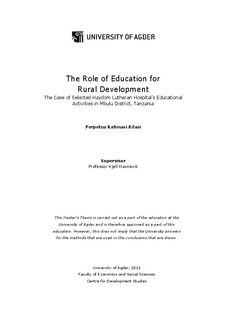The role of education for rural development : the case of selected Haydom Lutheran Hospital`s educational activities in Mbulu district, Tanzania
Master thesis
Permanent lenke
http://hdl.handle.net/11250/135211Utgivelsesdato
2011Metadata
Vis full innførselSamlinger
Sammendrag
This study explores the role that education and training programs initiated and/supported
by Haydom Lutheran Hospital play to the development of the rural community. The
study have identified some education and training programs by Haydom Lutheran
Hospital and explored the motives behind the establishment of those programs as well as
the perceptions of the local community towards education in general and established
programs in specific. The challenges associated with the establishment of education and
training programs have also been explored. The experiences learned from the case study
as a development project have been highlighted as lesson and example for the expected
project at Kabanga Nickel in implementing the Corporate Social Responsibility mission.
The findings indicate that various education programs, formal and non-formal have
played a great role in the improvement of the living standard of the people around the
hospital. On the other hand the contribution of education has been evidenced in the
capacity building to the majority of the population that have been possible through
education programs. This was highlighted by the number of people that have passed
though Haydom Primary School, Dr. Olsen Secondary School, Nursing school, The
vocational/trade School, Ngwandaq Primary School as well as by the working population
that have been going through in-service training for various professions in the hospital.
The life standard of the educated working population is used as a role model to the rest of
the illiterate community and continues to build the positive attitude towards education.
The main recommendation for the Kabanga Project is that they should aim to build the
capacity of the local community through quality education programs that fit the local
community around the project. The educated population will be the foundation of the
socio-economic success of the community and they will not solely depend on the project
because of the skills and knowledge through education. The establishment of the
programs should be in a participatory way so that the community also contribute to the
development of education programs using the available resources. The implication here is
that they will feel that they own the programs and they are responsible for future
improvement of the programs.
Beskrivelse
Master thesis in development management- University of Agder 2011
